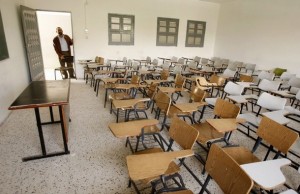
A record number of Latino students in Alabama continue to miss classes in the wake of the state’s tough immigration law, even as school officials clamor to reassure parents they have nothing to fear.
On Monday alone 2,285 Latino students missed school, according to data from the Alabama Department of Education. U.S. District Judge Sharon Lovelace Blackburn approved most parts of the immigration law last Wednesday, including the provision that requires schools to check students’ immigration status.
In one school system located in Shelby County, up to 40 students had officially been withdrawn from classes by Tuesday. Latinos make up 8 percent of all the students there.
“We are working really hard to try to get information home to those parents to help calm those fears down,” Cindy Warner, the public relations supervisor for the Shelby County school system, said. “If your child is already enrolled in school, it doesn’t apply to you. They will still be enrolled — federal law states that we cannot block their enrollment and must still continue to serve them. The issue will be that there will be one extra step in the reporting process — that we’ll report to the state department the number of students who couldn’t provide birth certificates.”
In Albertville, a small town that has drawn hundreds of Hispanic immigrants to work in the poultry processing plants located there over the last several years, up to 123 students had already withdrawn from classes.
And Latinos are not just withdrawing from school, many are opting to leave the state altogether. One landlord who rents and sells houses to Latinos says his occupancy rate dropped by a quarter and could get worse.
Residents say their daily routine has been disrupted over fear of the authorities enforcing the immigration law.
“I am afraid to drive to church.,” a 54-year-old poultry plant worker identified only as Candelaria, said. “The lady that gives me a ride to work said she is leaving. She said she felt like a prisoner.”

Recent Comments